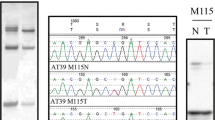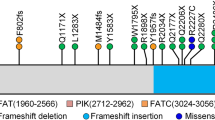Abstract
Background
Women who are heterozygous for variants in the ataxia telangiectasia mutated (ATM) gene, ATM carriers, have been reported to be at increased risk for breast cancer compared with women who do not posses an alteration in this gene. Aside from BRCA1 and BRCA2, there are few data on breast cancer susceptibility genes in African-American women. The goal of this study was to determine whether there is evidence that ATM is a breast cancer susceptibility gene in African-American women.
Methods
One hundred thirty two African-American women were screened for ATM sequence alterations. Thirty-seven (28%) were women with a histological diagnosis of breast cancer (cases). These women were not selected on the basis of a breast cancer family history. Ninety-five (72%) were age-matched women who had not been diagnosed with breast cancer (controls). Genetic variants were identified using denaturing high-performance liquid chromatography (DHPLC).
Results
Twenty-three of the 37 (62%) cases possessed at least one ATM variant. Fifty-eight of the 95 (61%) (P = 0.54) age-matched controls harbored at least one ATM variant. For subjects specifically possessing missense variants, 46% of cases and 48% of controls had these types of sequence variants. In addition, 19% of cases and 34% of controls possessed multiple ATM sequence variants (P = 0.07). The most common polymorphisms were the 378 T→A which was seen in 19% of cases and 27% of controls (P = 0.22), 5557 G→A identified in 22% of cases and 18% of controls (p = 0.40), 2685 A→G which was detected in 11% of cases and 6% of controls (P = 0.22), and 1254 A→G which was found in 3% of cases and 9% of controls (P = 0.36). Hence, there were no significant differences in any of the genetic variants detected between the case and control subjects.
Conclusion
We found no statistically significant differences in the overall frequency of ATM variants, nor any specific variant type or group, between African-American women who had been diagnosed with breast cancer compared with an age-matched cohort of African-American women who did not have breast cancer. ATM, therefore, does not appear to represent a breast cancer susceptibility gene in the general African-American population.
Similar content being viewed by others
References
Phillips K-A, Glendon G, Knight J (1999) Putting the risk of breast cancer in perspective. N Engl J Med 340:141–144
Thull DL, Vogel VG (2004) Recognition and management of hereditary breast cancer syndromes. Oncologist 9:13–24
Walsh T, Casadei S, Coats KH et al (2006) Spectrum of mutations in BRCA1. BRCA2, CHEK2, and TP53 in families at high risk of breast cancer. JAMA 295:1379–1388
King MC, Marks JH, Mandell JB (2003) Breast and ovarian cancer risks due to inherited mutations in BRCA1 and BRCA2. Science 302:643–646
Malone KE, Daling JR, Neal C et al (2000) Frequency of BRCA1/BRCA2 mutations in a population-based sample of young breast carcinoma cases. Cancer 88:1393–1402
Nelen MR Padberg GW, Peeters EA et al (1996) Localization of the gene for Cowden disease to chromosome 10q22–23. Nat Genet 13:114–116
Nelen MR, Padberg GW, Peeters EA et al (2004) CHEK2*1100 delC and susceptibility to breast cancer: a collaborative analysis involving 10,860 breast cancer cases and 9,065 controls from 10 studies. Am J Hum Genet 74:1175–1182
Meijers-Heijboer H, van den Ouweland A, Klijn J et al (2002) Low-penetrance susceptibility to breast cancer due to CHEK2(*)1100 delC in noncarriers of BRCA1 or BRCA2 mutations. Nat Genet 31:55–59
McKinnon PJ (2004) ATM and ataxia telangiectasia. EMBO Rep, 5:772–776
Lavin MF (2005) How important is ATM? Radiat Res 163:704
Morrell D Cromartie E Swift M (1986) Mortality and cancer incidence in 263 patients with ataxia-telangiectasia. J Natl Cancer Inst 77:89–92
Swift M, Morrell D, Massey PB, Chase CL (1991) Incidence of cancer in 161 families affected by ataxia-telangiectasia. N Engl J Med 325:1831–1836
Shiloh Y (2003) ATM and related protein kinases: safeguarding genome integrity. Nat Rev Cancer 3:155–168
De Jong MM, Nolte IM, te Meerman GJ et al (2002) Genes other than BRCA1 and BRCA2 involved in breast cancer susceptibility. J Med Genet 39:225–242
Inskip HM, Kinlen LJ, Taylor AM, Woods CG, Arlett CF (1999) Risk of breast cancer and other cancers in heterozygotes for ataxia-telangiectasia. Br J Cancer 79:1304–1307
Geoffroy-Perez B, Janin N, Ossian V et al (2001) Cancer risk in heterozygotes for ataxia-telangiectasia. Int J Cancer 93:288–293
Olsen JH, Hahnemann JM, Borresen-Dale AL et al (2001) Cancer in patients with ataxia-telangiectasia and in their relatives in the nordic countries. J Natl Cancer Inst 93:121–127
Renwick A, Thompson D, Seal S et al (2006) ATM mutations that cause ataxia-telangiectasia are breast cancer susceptibility alleles. Nat Genet 38:873–875
Angele S, Romestaing P, Moullan N et al (2003) ATM haplotypes and cellular response to DNA damage: association with breast cancer risk and clinical radiosensitivity. Cancer Res 63:8717–8725
Szabo CI, Schutte M, Broeks A et al (2004) Are ATM mutations 7271T→G and IVS10-6T→G really high-risk breast cancer-susceptibility alleles? Cancer Res 64:840–843
Thompson D, Duedal S, Kirner J et al (2005) Cancer risks and mortality in heterozygous ATM mutation carriers. J Natl Cancer Inst 97:813–822
Stredrick DL, Garcia-Closas M, Pineda MA et al (2006) The ATM missense mutation p.Ser49Cys (c.146C > G) and the risk of breast cancer. Hum Mutat 27:538–544
Heikkinen K, Rapakko K, Karppinen SM et al (2005) Association of common ATM polymorphism with bilateral breast cancer. Int J Cancer 116:69–72
Langholz B, Bernstein JL, Bernstein L et al (2006) On the proposed association of the ATM variants 5557G > A and IVS38–8T > C and bilateral breast cancer. Int J Cancer 119:724–725
Koren M, Kimmel G, Ben-Asher E et al (2006) ATM haplotypes and breast cancer risk in Jewish high-risk women. Br J Cancer 94:1537–1543
Bernstein JL, Bernstein L, Thompson WD et al (2003) ATM variants 7271T > G and IVS10-6T > G among women with unilateral and bilateral breast cancer. Br J Cancer 89:1513–1516
Lindeman GJ, Hiew M, Visvader JE et al (2004) Frequency of the ATM IVS10-6T→G variant in Australian multiple-case breast cancer families. Breast Cancer Res 6:R401–R407
Sommer SS, Buzin CH, Jung M et al (2002) Elevated frequency of ATM gene missense mutations in breast cancer relative to ethnically matched controls. Cancer Genet Cytogenet 134:25–32
Sommer SS, Jiang Z, Feng J et al (2003) ATM missense mutations are frequent in patients with breast cancer. Cancer Genet Cytogenet 145:115–120
Bretsky P, Haiman CA, Gilad S et al (2003) The relationship between twenty missense ATM variants and breast cancer risk: the Multiethnic Cohort. Cancer Epidemiol Biomarkers Prev 12:733–738
Feng J, Yan J, Chen J et al (2003) Absence of somatic ATM missense mutations in 58 mammary carcinomas. Cancer Genet Cytogenet 145:179–182
Thorstenson YR, Roxas A, Kroiss R et al (2003) Contributions of ATM mutations to familial breast and ovarian cancer. Cancer Res 63:3325–3333
Chenevix-Trench G, Spurdle AB, Gatei M et al (2002) Dominant negative ATM mutations in breast cancer families. J Natl Cancer Inst 94:205–215
Campbell C, Mitui M, Eng L et al (2003) ATM mutations on distinct SNP and STR haplotypes in ataxia-telangiectasia patients of differing ethnicities reveal ancestral founder effects. Hum Mutat 21:80–85
Thompson D, Antoniou AC, Jenkins M et al (2005) Two ATM variants and breast cancer risk. Hum Mutat 25:594–595
Greenlee RT, Murray T, Bolden S, Wingo PA (2000) Cancer statistics 2000, CA. Cancer J Clin 50:7–33
Johnson ET (2002) Breast cancer racial differences before age 40–implications for screening. J Natl Med Assoc 94:149–156
Pal T, Permuth-Wey J, Holtje T, Sutphen R (2004) BRCA1 and BRCA2 mutations in a study of African American breast cancer patients. Cancer Epidemiol Biomarkers Prev 13:1794–1799
Elmore JG, Moceri VM, Carter D, Larson EB (1998) Breast carcinoma tumor characteristics in black and white women. Cancer 83:2509–2515
Mountain JL, Risch N (2004) Assessing genetic contributions to phenotypic differences among ‘racial’ and ‘ethnic’ groups. Nat Genet 36:S48–S53
Royal CD, Dunston GM (2004) Changing the paradigm from ‘race’ to human genome variation. Nat Genet 36:S5–S7
Armstrong K, Micco E, Carney A, Stopfer J, Putt M (2005) Racial differences in the use of BRCA1/2 testing among women with a family history of breast or ovarian cancer. Jama 293:1729–1736
Olopade OI, Artioli G (2004) Efficacy of risk-reducing salpingo-oophorectomy in women with BRCA-1 and BRCA-2 mutations. Breast J 10(1):S5–S9
Bernstein JL, Langholz B, Haile RW et al (2004) Study design: evaluating gene-environment interactions in the etiology of breast cancer - the WECARE study. Breast Cancer Res 6:R199–R214
Iannuzzi CM, Atencio DP, Green S, Stock RG, Rosenstein BS (2002) ATM mutations in female breast cancer patients predict for an increase in radiation-induced late effects. Int J Radiat Oncol Biol Phys 52:606–613
Author information
Authors and Affiliations
Corresponding author
Rights and permissions
About this article
Cite this article
Hirsch, A.E., Atencio, D.P. & Rosenstein, B.S. Screening for ATM sequence alterations in African-American women diagnosed with breast cancer. Breast Cancer Res Treat 107, 139–144 (2008). https://doi.org/10.1007/s10549-007-9531-x
Received:
Accepted:
Published:
Issue Date:
DOI: https://doi.org/10.1007/s10549-007-9531-x




